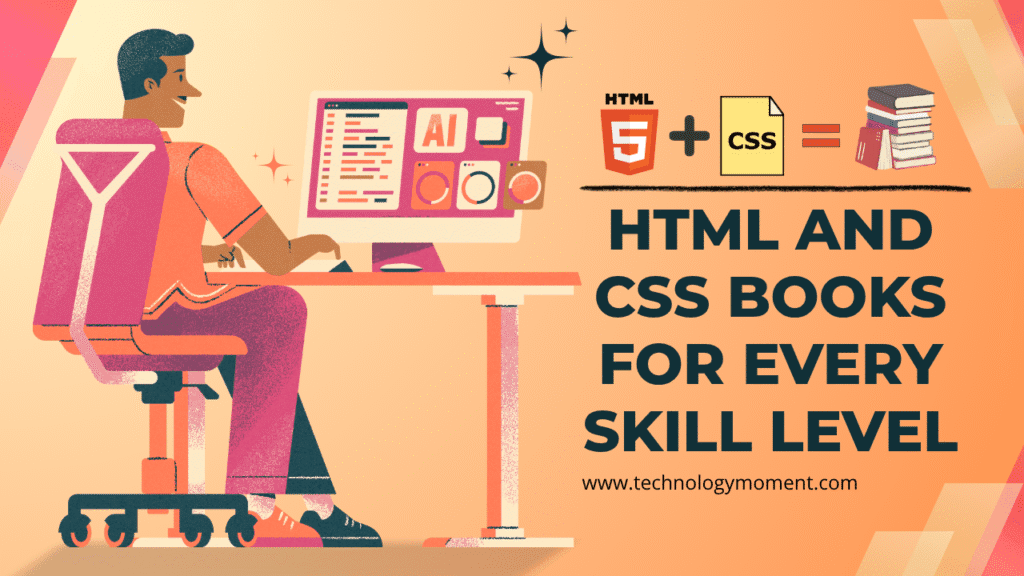
Welcome to Technology Moment – Where Your Learning Journey Meets Possibility. At Technology Moment, we believe that learning should feel less like a lecture and more like a moment of discovery. That’s why we’re here—not just to deliver information, but to guide you through your technical evolution with practical, real-world insights that matter. Whether you’re sitting at a café in Paris with your laptop open, trying to decipher your first TypeScript book’s interface, or you’re in Mumbai coding late into the night, unsure if you need a type or an interface. We know what it feels like to be there. We’ve been there too.
Just recently, a developer from São Paulo shared with us how a single TypeScript book—something he picked up on a whim—changed how he writes front-end code forever. It wasn’t some viral tutorial or flashy YouTube video, but a good old-fashioned book, dog-eared and marked with sticky notes, that gave him clarity and confidence. Another story came from Lagos, Nigeria, where a university student used free resources on GitHub paired with a well-recommended TypeScript book to land her first remote internship with a tech startup in Berlin. That’s the power of focused, structured learning.
See, TypeScript isn’t just another tool—it’s the language that bridges the gap between chaotic JavaScript codebases and scalable, production-ready applications. But learning it can be overwhelming. There’s documentation, there are countless blog posts, endless Reddit threads, and then there are books. Beautiful, in-depth, thoughtfully written books that can take you from not knowing what any means to create complex types for enterprise-level apps confidently.
But not all books are made equal. Some are perfect for fresh minds just getting started; others are dense, demanding, and meant for seasoned developers. The secret? Finding what suits your learning path, not what works for everyone else.
Here at Technology Moment, we’ve curated this article with one goal in mind: to help you find the best TypeScript books for your level. Whether you’re just stepping into TypeScript for the first time or you’re a JavaScript veteran ready to master advanced patterns and internals, this guide has something for you.
Because at the end of the day, it’s not just about reading. It’s about unlocking the version of you that codes with clarity, precision, and confidence—no matter where in the world you’re coding from.
So grab a coffee, open your favorite code editor, and let’s get you started on your next learning moment.
Table of Contents
Let’s start from the very beginning: why even bother with TypeScript? Maybe you’ve worked on a codebase where bugs slip through silently or spent hours debugging undefined values, only to discover a simple type mismatch. That’s when most developers begin to appreciate what TypeScript brings to the table: structure, predictability, and sanity in an otherwise wild JavaScript world.
Take Alina, for example, a frontend developer in Warsaw who was working on an e-commerce site. She didn’t think she needed TypeScript—until a single bug caused a checkout failure during a Black Friday sale. It cost the company thousands. That weekend, she picked up a TypeScript book, not just to learn, but to never be caught off guard again. Books are like that—they offer more than answers; they offer perspective.
Choosing the Right Book Based on Your Level
But here’s the catch: TypeScript is not a one-size-fits-all language, and neither are its learning resources. The internet is overflowing with TypeScript books, blogs, and tutorials. Some are brilliant, others are outdated, and a few are so dense they feel like reading a manual for a spaceship.
That’s where picking the right book for your level becomes crucial. Imagine a beginner in Nairobi opening a TypeScript book that jumps straight into decorators and advanced generics—they’d probably close it before page 10. On the other hand, an experienced JavaScript developer in San Francisco might feel bored flipping through chapters on variables and loops. The goal isn’t just to read—it’s to read what makes sense to you, at your level, and right now.
This is why we’ve carefully categorized the best TypeScript books into learning stages: beginners, foundational, intermediate, and advanced, so that wherever you are on your journey, there’s a book that speaks directly to you.
TypeScript Books for Beginners
Let’s talk about those who are just starting — maybe you’re new to programming entirely, or you’ve dabbled with JavaScript but find TypeScript’s static typing a bit intimidating. You’re not alone.
In Manila, a university student named Leo wanted to impress his internship mentors with modern coding skills. He downloaded the official TypeScript documentation but felt overwhelmed. “Where do I even start?” he asked. That’s when a mentor handed him a beginner-friendly TypeScript book. It explained things like any, number, string and how functions could be typed. That one book, written in plain English with lots of code examples and relatable metaphors, became his learning anchor.
Good beginner books don’t assume you already know object-oriented programming or functional paradigms. Instead, they walk you through setting up the TypeScript Playground, gradually introduce types and interfaces, and show you how to compile your first .ts file without breaking a sweat. These books often mix learning with small projects—like building a simple todo app—to keep things fun and digestible.
When starting with TypeScript, it’s okay if you don’t grasp everything right away. A good beginner’s book allows space for failure, repetition, and reflection—qualities that online tutorials can sometimes rush past. They’re designed not just to teach, but to build confidence.
Foundational Level TypeScript Books
Once you’ve wrapped your head around the basics—types, functions, interfaces, and maybe some classes—it’s time to go deeper. This is the foundational stage. You’re no longer asking “What is TypeScript?”—you’re asking “How does TypeScript help me write better code?”
Let’s take Anika, a backend developer in Berlin who recently switched teams to work on a full-stack TypeScript project. She understood the syntax but struggled with understanding how types should be structured in a large-scale codebase. Reading foundational-level books gave her clarity. These books offered insight into why TypeScript matters in real-world applications. They didn’t just teach what to do—they explained why it works.
This is the stage where books begin to introduce more nuanced features of the language: generics, type narrowing, modules, type guards, and the difference between type aliases and interface. You’ll start to see examples drawn from real business logic, like how to model an order management system or design API response types.
Foundational books also begin to emphasize best practices: how to write types that scale, how to document your code properly, and how to refactor JavaScript to TypeScript. They may even begin introducing automated tools like linters and compilers, showing how TypeScript fits into the broader development workflow.
At this point, you’re not just learning to use TypeScript—you’re learning to think in TypeScript.
Intermediate Level TypeScript Books
At the intermediate stage, you’ve likely played around with TypeScript a bit—maybe written some interfaces, worked with basic types, or even added TS to a JavaScript project to see what would break. You’re no longer asking, “What is TypeScript?” but more, “How can I use this better?”
Take, for example, a developer from Vancouver who shared his experience with us. He had been working on a React project for months, but kept running into weird bugs that didn’t show up until runtime. Once he picked up an intermediate TypeScript book—focused on practical patterns and better tooling—everything clicked. He started using union types, discriminated unions, utility types like Partial<>, and started treating types as first-class citizens. Suddenly, bugs were caught before he hit “Run”, not after.
Books at this level go beyond explaining syntax. They begin introducing architectural thinking, showing how TypeScript integrates with modern JavaScript tooling like ESLint, Webpack, or even frameworks like Next.js. You’ll encounter real-world examples—how to type your Redux store, how to work with generics effectively, and how to refactor large codebases without losing your mind.
You begin to not just use TypeScript, but to think in TypeScript. And that’s the bridge to advanced mastery.
Advanced TypeScript Books
Now let’s talk about the developers who are building systems, not just using them. If you’re knee-deep in production apps, managing contributions from multiple team members, and finding that TypeScript is both your shield and sword, you’re in advanced territory.
Advanced TypeScript books cater to people like you.
Imagine a CTO in Berlin whom we interviewed. His team was scaling a fintech product with millions of monthly users. JavaScript just couldn’t handle the pressure anymore—too many edge cases, too many errors leaking into production. They turned to TypeScript, but the team had to grow their skills fast. The CTO gave each dev a copy of an advanced TypeScript book focused on design patterns and architecture. Within weeks, productivity rose, bugs dropped, and developers started discussing types like they were design assets.
Books at this stage will show you things like conditional types, mapped types, recursive type definitions, and constraint-based generics. They don’t waste time on string vs number — They dive straight into how TypeScript interacts with real-world software design. You’ll learn how to write abstractions that don’t leak, how to model data elegantly, and how to enforce business logic at the type level—before you write a single line of code.
If you’re a senior developer or team lead, these books will help you build Type-safe systems, not just clean code.
Expert Level TypeScript Books
Now comes the fun part—the bleeding edge. If advanced TypeScript books are for architects, expert-level books are for the language tinkerers, library authors, and TypeScript evangelists. These are the books that don’t just use TypeScript—they dissect it.
Let me tell you about a developer in Tokyo. He works on an open-source project used by thousands globally. He didn’t just want to write with TypeScript—he tried to understand its compiler, how declaration files are parsed, and how type inference works. He turned to a free, deep-dive book hosted on GitHub, known throughout the community as a goldmine for internals. That book opened doors. He’s now contributing directly to open-source TS tooling, helping shape how other developers write code.
Expert books—especially free resources maintained by TypeScript contributors—often focus on the inner workings of the language. You’ll see how the TS compiler transforms types into JS, how the config options impact output, and even how to write your plugins for advanced workflows. You’ll walk through reading and debugging .d.ts files, writing custom transformer functions, and more.
These aren’t books for the faint-hearted, but if you want to build the next great TypeScript-powered tool or contribute to the language itself, this is your level.
Specialization: React, Design Patterns, and More
Finally, there’s specialization—a stage that doesn’t depend on how “good” you are with the language, but more on what you want to do with it. Maybe you’re building modern React apps, architecting serverless APIs, or exploring domain-driven design. In every niche, there’s a TypeScript book ready to guide you deeper.
Let’s zoom in on a junior developer from Nairobi. She was confident in basic TypeScript but struggled when it came to combining it with React. Prop types confused her, state management felt clunky, and generic components were overwhelming. A React + TypeScript-specific book changed all that. By walking through real-world React examples—from controlled forms to reusable hooks—she gave herself the confidence to contribute to her company’s main web app. Within months, she was promoted to mid-level dev.
Books in this category are extremely practical. They might focus on writing strongly-typed React components or applying design patterns like the Builder, Strategy, or Observer with TypeScript. Some focus on integration with backend systems—how to type API responses, enforce DTOs, or use GraphQL in a fully type-safe way.
There are even books tailored to hybrid devs using TS with Node.js, Express, NestJS, or Deno. For those focused on software architecture, books that demonstrate how to utilize types as guardrails for code quality.
Specialization books help you apply TypeScript not as a tool, but as a superpower, customized to your tech stack and your goals.
Where to Find TypeScript Books
You might think the best place to find TypeScript books is simply Amazon—and while that’s not wrong, it’s just the tip of the iceberg. The truth is, your location, budget, and preferred learning style all play a role in where you should look.
In Tokyo, for instance, developers often turn to physical bookstores that specialize in translated programming books—yes, TypeScript has made it into several languages! A friend from Kyoto once shared how he stumbled across a Japanese edition of “Programming TypeScript” while browsing Kinokuniya and how it changed the way he handled large-scale front-end systems at his job.
Then there’s GitHub, a goldmine for free resources. Basarat Ali Syed wrote the book “TypeScript Deep Dive.” It’s open-source, community-driven, and constantly updated, making it a favorite for learners in developing nations where paid books aren’t always accessible. I recently heard from a developer in Nairobi who printed out chapters from the GitHub PDF and studied them like textbooks during a local hackathon.
And of course, Reddit has its own set of unsung heroes. Subreddits like r/typescript and r/learnprogramming often share updated book recommendations based on real developer feedback. These posts, combined with comments from people across the globe, paint a clear picture of which books are beginner-friendly and which are better left to those with a few years of JavaScript under their belts.
Lastly, don’t ignore eBook platforms and online courses that come bundled with books. Platforms like O’Reilly, Packt, and Leanpub offer downloadable PDFs, and sometimes you get access to both the book and video tutorials for the same price. It’s ideal if you enjoy switching between reading and watching.
Tips for Reading and Practicing with TypeScript Books
Reading a TypeScript book is not like flipping through a novel on a lazy Sunday afternoon—it’s more like learning how to drive a manual car. You have to get your hands dirty, stall the engine a few times, and maybe curse under your breath before it clicks.
Start small. One reader from Berlin told me how he paired every chapter he read with an open tab of the TypeScript Playground, the interactive browser-based editor that lets you test TypeScript in real time. Instead of waiting to finish an entire chapter, he’d write snippets of code after every new concept. That made it stick.
Another tip? Use real-life projects. A student from Buenos Aires told me she took the TypeScript knowledge from her book and rebuilt her JavaScript-based recipe website using strict typing and interfaces. It wasn’t just academic learning anymore—it was personal. And it worked.
Don’t forget to annotate your book, whether it’s a Kindle highlight or scribbles in the margins. Make it your own. Reflect on questions like: “Where can I apply this?” or “What does this remind me of from JavaScript?”—because the more you link concepts to what you already know, the faster you’ll progress.
Lastly, don’t skip the exercises. Even if it feels tempting to breeze past them thinking, “I got this,” resist that urge. A developer from Cape Town shared how skipping exercises early on cost him clarity later. When he circled back and started solving them with intention, his code quality skyrocketed.
Conclusion
Learning TypeScript is not a destination—it’s a journey with multiple entry points. And like any great journey, the companions you bring along make a big difference. In this case, your companions are the books you choose.
It doesn’t matter whether you’re a complete beginner reading in a hostel in Chiang Mai, a bootcamp graduate trying to stand out in the Toronto tech scene, or a freelance dev from Dhaka aiming to land bigger clients. What matters is that you’re willing to learn, to push your boundaries, and to find the tools that speak your language—literally and figuratively. Books still hold that kind of magic. They give you structure in a sea of scattered tutorials. They offer depth where videos may only skim.
So take this as your nudge. Pick up that book—whichever one matches your current level. Commit to it. Open the TypeScript Playground alongside it. Code messy, fail fast, and grow confidently. Because that’s what progress looks like in the real world.
FAQs
Can I learn TypeScript without knowing JavaScript first?
Technically, yes—but it’s not ideal. TypeScript builds on JavaScript. Knowing JS will help you understand TS much faster and avoid frustration.
Are free TypeScript books worth it compared to paid ones?
Absolutely. Resources like TypeScript Deep Dive are incredibly detailed and community-backed. Paid books often come with structure and exercises, but free ones are still very effective.
What’s better—reading TypeScript books or taking a course?
They serve different purposes. Books give you in-depth, structured learning. Courses are good for visual learners. Combine both for the best results.
How long does it take to become proficient in TypeScript?
It varies. If you’re already good with JavaScript, a few weeks of focused reading and hands-on practice can get you comfortable. Mastery, though, takes months of real-world use.
What’s the best way to stay updated with changes in TypeScript?
Follow the official TypeScript documentation, GitHub repos of authors like Matt Pocock, and stay active in Reddit and Twitter TypeScript communities.













